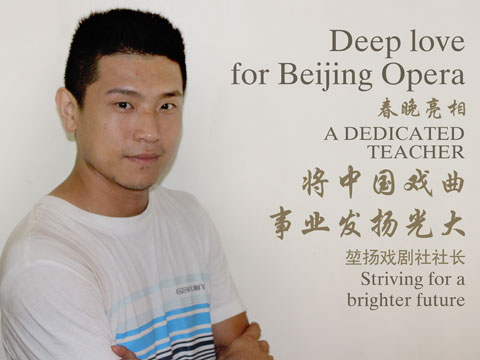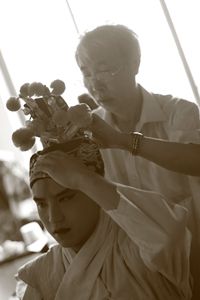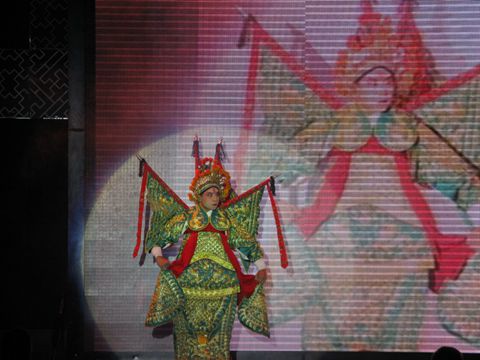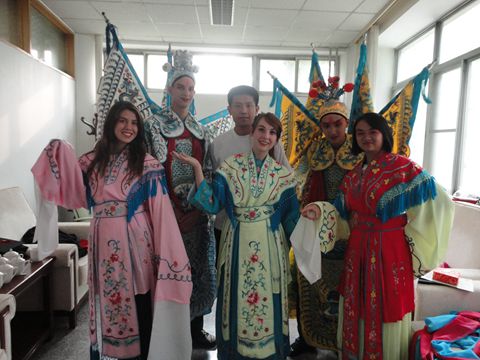
Yan Rong, leader of Kunyang Beijing Opera Troupe Photo: Billie Feng
The year 2013 marks the fifth anniversary of the establishment of Kunyang Beijing Opera Troupe. Although this privately run Beijing opera troupe is small compared to state-owned troupes such as the Beijing Peking Opera Theatre, its leader, Yan Rong, has big dreams. His ambition is to make Beijing opera known to people in every corner of the world. He said, “I hope to have a stage wherever there are Chinese people or people interested in Chinese culture.”
Yan Rong was born on October 1, 1979. His father and mother were ordinary workers without any connections with Chinese opera. Yan said, “Before I was born, my father liked listening to Beijing opera on his radio. Later, I felt some tunes sounded familiar the first time I listened to them. I don’t know why.”
Yan continued to listen to Beijing opera on the radio during his childhood. He started learning Beijing
 |
| Yan’s teacher Wang Zongwei helps him put on his costume. Photo: courtesy of Yan Rong |
opera at 13 and gave his debut performance at 14. He said, “I learned Beijing opera purely out of interest.”
In 1995, at the age of 16, he met his first formal teacher Wang Zongwei. Wang hoped that Yan would one day play lead roles in Beijing opera performances.
Yan Rong never received formal education in a Beijing opera school. His major in college was English, but he continued learning and performing Beijing opera in his spare time. After graduation in early 2008, he found a job in a company. “After staying for a few days, I found I just couldn’t get used to the routine of office work. My mind was still on Beijing opera. So I quit the job and made up my mind to make Beijing opera as my lifetime career.”
Encouraged by his teacher Wang Zongwen, Yan established Kunyang Beijing Opera Troupe in July, 2008. The character Kun (堃) comes from his style name Jinkun and the character Yang (扬) means to carry forward (the culture of Beijing opera). “As a matter of fact, I started the Beijing opera troupe from scratch. I spent my savings on costumes and asked my friends in the operatic circle to perform.” Now his troupe has 10 permanent performers.
When asked how many performances he has given since making his debut, he paused for a moment, then said, “Countless.” As well as regular theatre performances, he has appeared on the stage for the annual CCTV Spring Festival Opera Gala as well as annual conferences of a variety of enterprises. “Some of my regular customers could have hired performers from larger troupes like the Beijing Peking Opera Theatre, because those theatres enjoy a much higher reputation yet charge less than me. The reason they invite me to perform is that they believe in my skill and professional attitude.” Once after a performance, two foreign guests came backstage and wanted to have a picture taken with Yan. He had already taken off his costume and make-up, but on hearing why they had come, he began to put on his costume again. One of the guests said, “Don’t bother to put it on again. We want to have a picture with you, not your costume.” Yan said he felt very warm and happy on hearing this, “This means what had interested them was me, not the colorful costume. This is a real compliment on my performance.”

Yan performs on stage. Photo: courtesy of Yan Rong
Apart from performing on the stage, Yan also appears on TV. In the TV serial Tou Pai, he served as the stand-in for Lee Lichun (a well-known actor from Taiwan). Though he had no opportunity to show his face to the audience, his acting impressed both the director and Lee, evoking Lee’s memories of learning kung fu in high school.
Yan currently teaches Beijing opera classes at Peking University and Beijing No. 80 Middle School. All his students in these classes are foreign students. In class, he speaks Beijing dialect, but when students don’t understand him, he will explain in English. “I learned English in college. At that time it seemed to have nothing to do with my love for Beijing opera, but it helps me a lot now. What you have learned can always be useful somewhere, someday.” Yan enjoys teaching Beijing opera to foreign students. “I try my best to let my foreign student know about Beijing opera and Chinese culture as much as possible. I want them to take what they have learned here back to their own countries, so that the culture of Beijing opera can spread all over the world.” Yan tailors his classes to the abilities of different students. “One of my students was a girl from Kazakhstan. She was short so she was not suited to performing on the stage. I suggested she learn facial makeup. After a period of learning, she finished the course satisfactorily. I was so happy that she followed my advice and made progress.” He also holds online classes for overseas students.

Some of Yan’s students at No. 80 Middle School. Photo: courtesy of Yan Rong
When talking about the future development of the troupe, Yan said spreading the culture of Beijing opera still depends primarily on live performances in theatres. “Seeing Beijing opera in theatres is totally different from seeing on TV. You experience the performance at a deeper level in a theatre.”
Innovation in Beijing opera is not as easy as other performing arts, such as xiangsheng (crosstalk).
| Yan Rong adjusts the headwear for one of his students. Photo: Billie Feng |
But Yan is always adding modern elements to his performance. Once he even had a role of military general wearing a mutant ninja turtle T-shirt, and the audience burst into laughter when the general took off his armor. He said, “The western opera Notre Dame de Paris has been adapted to Beijing opera. I hope I can still make some alterations and perform it on the stage someday.”
Everyone has his or her dream, and Yan is no different. Now he makes a living by performing and teaching Beijing opera. But that is not his ultimate goal. He aspires to promote the development of this traditional performing art. “No matter whether I become famous or not, my love for Beijing opera will last forever. I believe I will leave something for later generations of performers after I die.”
|
|
||
 |
| Touched | Sympathetic | Bored | Angry | Amused | Sad | Happy | No comment |
Rhythm Media Group is a multi-media company, operating a US-based Chinese daily newspaper, The China Press, and the paper's website - uschinapress.com (which has mobile-app version), as well as a Beijing-based English website Sino-US.com. The group boasts 15 branch offices across the US, and a number of cultural centers focusing on culture-related business in the North America, Chinese mainland, Hong Kong and Taiwan.Launched in September 2012, the Sino-US.com is designed to serve as a bridge between China and the US, and to keep its readership inside or outside China better informed by providing news and insights on China's current affairs, culture, life, business, people and sports.
|
|